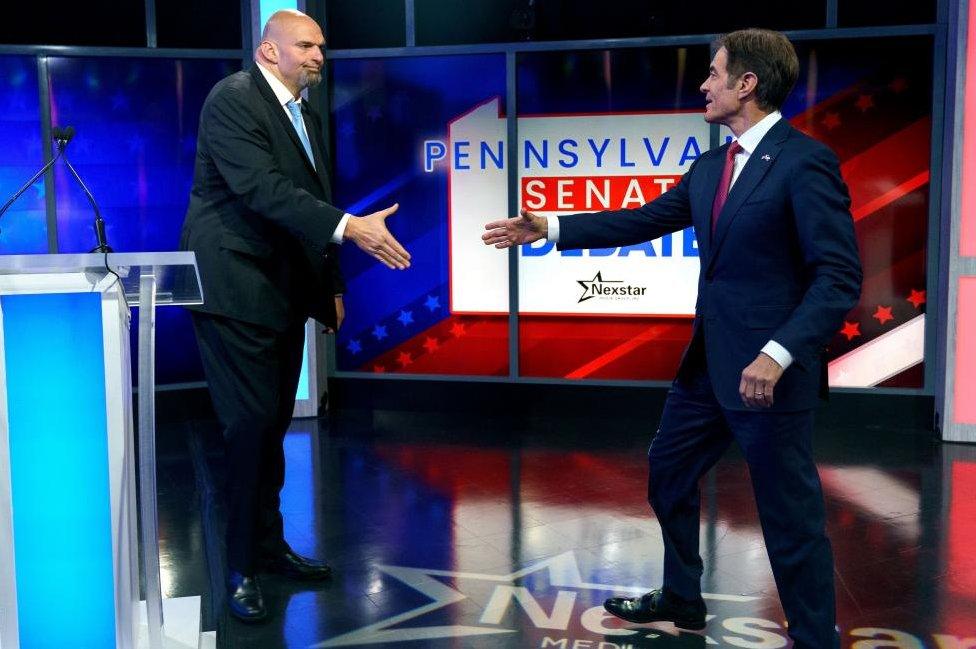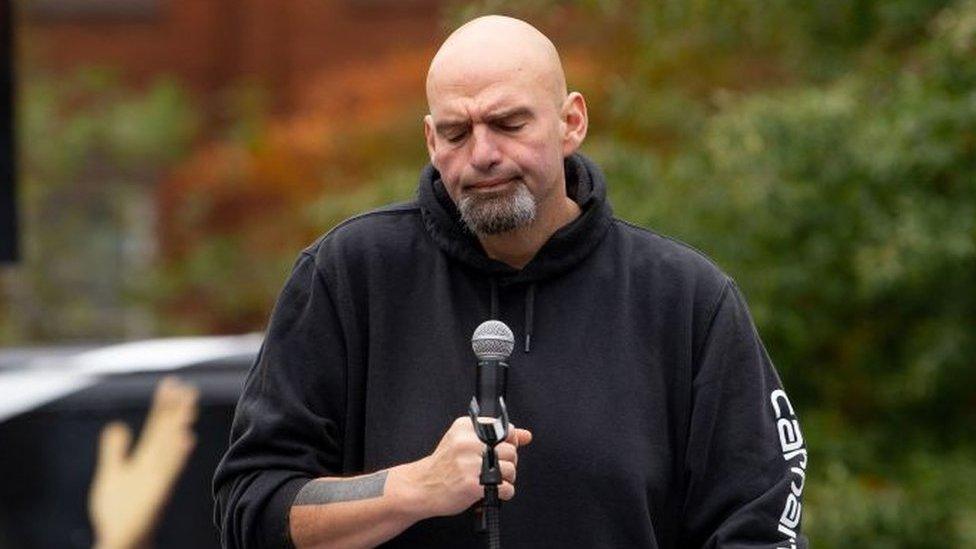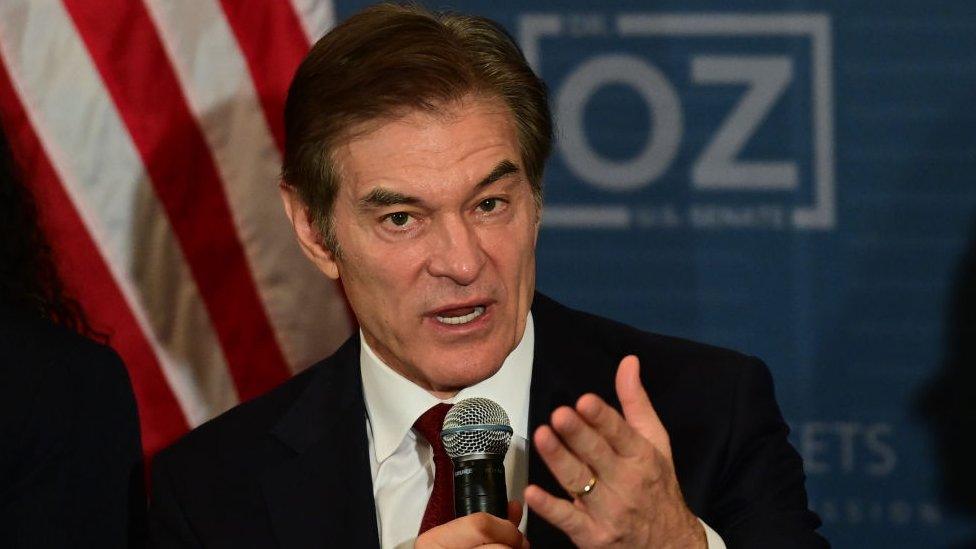Pennsylvania Senate race: Will Fetterman's debate struggles actually matter?
- Published

Democratic candidate Lt. Gov. John Fetterman (L) and Republican candidate Dr Mehmet Oz are contesting a key Senate race
Democrat John Fetterman hoped to demonstrate that a stroke he suffered in May would not adversely affect his ability to hold public office. A halting, tentative debate performance, however, has raised more questions about whether he is fit to serve in the US Senate.
The crowd of Fetterman supporters gathered to watch the debate at the Square Cafe in Pittsburgh, Pennsylvania, on Tuesday night were ready for a party. The City Paper, a local weekly newspaper, organised the event, which included a politics trivia contest and debate bingo cards with words and phrases that might come up during the one-hour candidate face-off - words like "abortion," "inflation" and "crime".
It turns out, however, that another bingo square, "Fetterman's health", would become the biggest story of the evening. The Democrat was clearly hampered by a stroke he suffered days before Democratic primary voters chose him as their candidate - a life-threatening episode brought on by a pre-existing heart condition.
As the debate progressed, bingo cards were left unfilled. The crowd was largely hushed, save for a few groans, and the biggest cheer came at the end, when Mr Fetterman - who once was mayor of a nearby town - said the Pittsburgh Steelers were his favourite American football team.
Supporters were left wondering how damaging his difficulty answering questions and responding to attacks from his Republican opponent, Mehmet Oz, might be.
"It's a shame," one said. "The reality is just because he has this medical condition and it impacts his life does not mean he's not a smart person."
He added that he hoped voters would see past one night's performance and focus on the issues they care about and the fact that control of the US Senate, currently divided 50-50 between Democrats and Republicans, is at stake in this race.
'Awkward pauses'
For months after his stroke, Mr Fetterman had stayed out of the public eye, instead relying on television adverts and an aggressively snarky social media campaign to build a polling lead over Dr Oz, whom he painted as a super-wealthy out-of-state political opportunist. (The Republican owns 10 mansions and primarily lived in New Jersey up until eying the Pennsylvania Senate seat).
As the November midterm election approached and Mr Fetterman's lead over Dr Oz narrowed to within the margin of error, however, pressure grew for him to agree to a televised public debate with his opponent.
He did so on the condition that he be allowed to read moderator questions and his opponent's answers on a closed-captioning system - an accommodation necessary, his campaign said, because the stroke has left him with audio processing difficulties.
Before the debate, the Fetterman campaign tried to lower expectations for their candidate's performance, releasing a memo that he was not a polished debater even before his stroke, that the challenge he currently faces is "real" and that he may take "awkward pauses ... missing some words and mushing other words together."
Reading that is one thing. Seeing it may turn out to be another.

Read more about US midterms
EXPLAINER: What are midterms and who's being elected?
ANALYSIS: Five reasons why these elections matter
ON-THE-GROUND: The voters who see a coming storm

Over the course of Tuesday evening, Mr Fetterman was unable to engage in the kind of quick, nimble replies and verbal sparring that typifies American political debates. His answers were occasionally jumbled and frequently short. While he was able to land some clearly prepared attacks on his opponent, his disability left him a beat behind.
When asked to explain a 2018 statement calling for a ban on oil fracking, a topic of considerable interest in shale-rich Pennsylvania, he was clearly flustered.
"I do support fracking," he said. "And I don't, I stand, and I do support fracking."
And that was all.
Should he have run - or rested?
Clips of Mr Fetterman's biggest stumbles are already circulating on social media, and conservatives - licking their chops over the prospect of winning the one Republican-held Senate seat that seemed at risk this year - are expressing shock and concern over the Democrat's condition and whether he should have been campaigning at all, instead of focusing on his rehabilitation.
"It's sad to see John Fetterman struggling so much," tweeted Pat Toomey, the Republican senator both candidates are seeking to replace. "He should take more time to allow himself to fully recover."

Mr Fetterman hopes more interviews in the days to come will allow him to show his ability
Last week, after a difficult television interview, Mr Fetterman released a letter from his physician saying that, while he continues to recover from the effects of his stroke, he would be fit to serve as senator. During the debate, however, the Democrat declined to release his full medical report, saying that Pennsylvanians could watch him and make up their minds. He attempted to paint his condition as helping him be more understanding of Pennsylvanians who are "knocked down" by adversity.
After the debate, however, his campaign scrambled to do damage control. A spokesperson blamed the closed-captioning system for being slow and "full of errors" - which the company responsible for the technology has denied.
The Fetterman camp has also said their man will sit down for more interviews in the next two weeks to show his ability outside of the rapid-fire debate spotlight. And he'll be back on the campaign trail quickly, with his first appearance coming at a Dave Matthews Band concert-rally in Pittsburgh.
Dr Oz stumbles over abortion
If there is a silver lining for Democrats from the debate, it's that Dr Oz, a doctor turned television host running in his first campaign, had some stumbles of his own, albeit of the more traditional "political gaffe" kind.
He said the federal minimum wage didn't need to be raised because Pennsylvanians should make much more than that. He pledged his support for Donald Trump, who remains highly unpopular among moderate US voters, if he ran for president in 2024. And during a question on a proposed federal abortion ban, he said the decision should be left up to a "woman, doctor and local political leaders" - an answer that may concern the majority of voters who favour protecting the right to an abortion.

Democrats have seized on Dr Oz's comments that "local political leaders" should be involved in abortion access
"I don't want anything to do with local politicians deciding what to do with my body," said Zoey Nishimura-Rush, who watched the debate at a table with her mother and some friends.
The Fetterman campaign is already promising to make Dr Oz's abortion comments a central part of their closing push. How effective they are at making that the focus, rather than their candidate's health, could decide the outcome of the race - and, ultimately, whether Democrats keep control of the Senate.
Does a bad debate make a difference?
Given the high stakes of the Pennsylvania race, featuring a famous Donald Trump-endorsed celebrity doctor and a hoodie-wearing, tattooed former mayor dealing with a serious medical condition, there was little doubt that Tuesday night's debate would garner considerable national attention - and it has.
Whether the debate makes a difference in the race, however, is far from certain. Early voting has already begun in Pennsylvania, and both sides have been blanketing the airwaves with millions of dollars in advertisements for months. A recent CBS News poll that gave Mr Fetterman a 51-49 lead - well within the margin of error - showed few voters in the state are uncertain whom to support at this point.
"I think Fetterman is unlikely to lose many committed supporters over his performance, so the focus is on the small share of undecided voters," said Jamie Wiggan, news editor at Pittsburgh's City Paper. "The question will be whether undecided voters can distinguish his auditory processing struggles from perceptions of broader cognitive decline despite assurances from his doctors this is not the case."
What may be of greater importance is whether Mr Fetterman's performance could hamper his ability to get core voters to the polls - which is traditionally a challenge for the in-power party during presidential midterm elections. Already there are concerns among Democrats over turnout in Pittsburgh and Philadelphia. That's part of the reason why both President Joe Biden and former President Barack Obama are planning on campaigning for Mr Fetterman in those cities the weekend before the election.
"Most Fetterman supporters are energised by his stance on the issues," Wiggans said. "At the same time, they're energised to vote against Oz because of his positions, and his associations with Trump during the Republican primary."
While questions of candidate competence and health could have an impact on close races, the partisan divisions within the US - particularly when a Senate majority is at stake - may mean few, if any, minds are changed. And that is not a particularly recent trend.
In 2000, Democrat Mel Carnahan defeated incumbent Republican John Ashcroft in a Missouri Senate race, resulting in a 50-50 split between the two parties in the chamber.
Carnahan had died in an plane crash the month before.